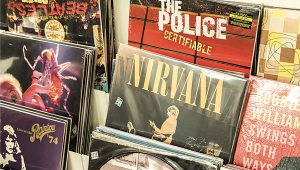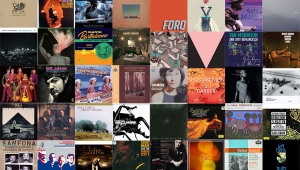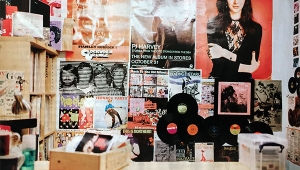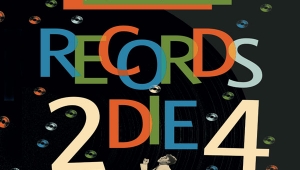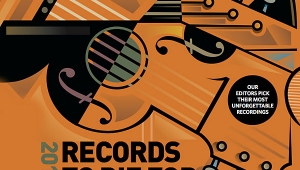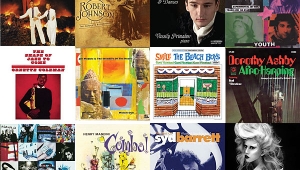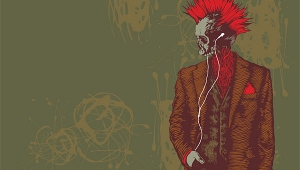| Columns Retired Columns & Blogs |
2002 Records To Die For Page 4
Robert Deutsch
BEETHOVEN: Symphonies 1-9, Piano Concertos 1-5, Violin Concerto, Overtures
Wilhelm Backhaus, piano; Henryk Szeryng, violin; Hans Schmidt-Isserstedt, Vienna Philharmonic
Decca 467 892-2 (8 CDs). 2001. No prods. or engs. listed. ADD. TT: 10:09:31
Hans Schmidt-Isserstedt's recording of Beethoven's "Choral" symphony has been a favorite of mine for many years now, but I hadn't thought of writing it up as an R2D4 until I happened to hear a more recent recording of the work, with Nikolaus Harnoncourt conducting the Chamber Orchestra of Europe. The mediocre quality of the singing and what seemed to me to an entirely wrongheaded approach—too jolly, and lacking the majesty that I believe to be part of Beethoven's vision—led me to put on the LP of Schmidt-Isserstedt's version as soon as I got home. Ah, yes, this is what this music is supposed to sound like! The vocal quartet of Sutherland, Horne, King, and Talvela has not been bettered (just listen to Martti Talvela's Voice-of-God entrance on "Freude!"), the Vienna Philharmonic plays with commitment, and Schmidt-Isserstedt gives full weight and meaning to every aspect of this masterpiece.
VODKA & CAVIAR: The Ultimate Russian Spectacular
Music of Borodin, Khachaturian, Tchaikovsky
Constantine Orbelian, Philharmonia of Russia
Delos DS-3288 (SACD/CD, stereo/multichannel). 2001. Ramiro Belgardt, prod.; Jeff Mee, eng. DDD. TT: 65:12
A recording titled Vodka & Caviar: The Ultimate Russian Spectacular is likely to be dismissed by as mere fluff more likely to appeal to lovers of sound than of music. The sound is truly spectacular in CD, and even more in the SACD format (it's a hybrid disc), but the recording contains some wonderful music by Tchaikovsky, Borodin, and Khachaturian. Conductor Constantine Orbelian, born in America of Russian and Armenian émigré parents, has a real feel for this material, and the Philharmonia of Russia plays with precision and verve. The recording is simply a lot of fun; you'd have to be a thoroughly jaded curmudgeon not to enjoy it. File this one under "Guilty Pleasures," if you like, but don't miss it.
ARNOLD: Symphonies 5 & 6
Andrew Penny, National Symphony Orchestra of Ireland
Naxos 8.552000 (CD). 2001. Tim Handley, prod., eng. DDD. TT: 57:17
Malcolm Arnold's middle symphonies sometimes bask in the air of unapologetic, nostalgia-tinged pop, but I see that as a stylistic choice that's often helped this composer open deeper, darker expressive doors—as in Symphony 5's Andante con moto. Andrew Penny's probing leadership, abetted by the composer's presence in the studio, allows Arnold's poignant tunes to soar and catch their collective breath. The ideal orchestral balances are mirrored by Naxos' superb engineering.
HAYDN: Complete String Quartets
Angeles String Quartet
Philips 464 650-2 (21 CDs). 2001. Joanna Nickrenz, prod.; Marc Aubort, eng. DDD. TT: 22:30:00
Here's a chamber-music buff's dream come true: Haydn's complete string quartets, packaged in an elegant, space-saving box, all stunningly performed. The young, California-based Angeles String Quartet worked on this project for five years, and it shows. Their masterful playing abounds in stylish intelligence and impeccably timed transitions, along with subtle dynamic nuances and color shadings that illuminate the music's boundless invention rather than shift your attention to the performers' effortless virtuosity. Add Philips' gorgeous, warm sonics and you've got a reference Haydn set that towers over the competition.
Montrose: Montrose
Warner Bros. 3106-2 (CD). 1973. Montrose, Ted Templeman, prods.; Donn Landee, eng. AAD. TT: 32:21
This isn't exactly a record to die for, but it could likely stir up a decent fistfight between two people who care passionately for hard rock, one of whom holds that Montrose is the most woefully underrated album of its kind. When it's time to turn off your brain, crank the speakers, and play some serious air guitar, "Bad Motor Scooter," "Rock the Nation," and "Rock Candy" will do just fine, while "Space Station #5" contains one of the definitive rock'n'roll screams, courtesy a then-unknown singer named Sam Hagar. Montrose is a guilty pleasure, sure, but a pleasure nonetheless.
UNCLE TUPELO: Still Feel Gone
Rockville ROCK 6070-2 (CD). 1991. Paul Q. Kolderie, Sean Slade, prods., engs. AAD. TT: 38:09
For those who miss the one-two punch of songs by Uncle Tupelo principals Jeff Tweedy and Jay Farrar, who have gone on to lead Wilco and Son Volt, respectively, a listen to Still Feel Gone is a bracing trip down memory lane. Farrar's "Looking for a Way Out" is the song that best exemplifies the band's brand of small-town ennui, while "Still Be Around" stands as their best ballad. Tweedy's "Gun" is a furious rocker dealing with disappointment in love, while "Nothing" succeeds in lowering expectations, then blowing them away. "Don't call it nothin' / It might be all we ever have," he sings, raw-throated. Luckily, time proved him wrong on that count. This one's a classic.
TONY BENNETT: At Carnegie Hall
Tony Bennett, vocals; Ralph Sharon and His orchestra
Columbia C2S 823 (2 LPs). 1962/1997. Ernie Altschuler, prod.; Frank Laico, eng. AAA/AAD. TT: 75:40
Yet another superb-sounding document from recording's golden age, committed to tape during Tony Bennett's audacious 1962 Carnegie Hall debut. As soon as conga drummer Candido hits the skins in the intro to "Lullaby of Broadway," you'll know you're in for a sonic treat. Columbia's skilled recording team wisely backed the mikes off sufficiently to capture plenty of the great hall's reverberant field while avoiding a washout. Great image focus, fine soundstaging, and slippery-wet ambience add up to a "you are there" (but not in the front row!) experience.
BOB DYLAN: The Times They Are A-Changin'
Columbia/Sundazed LP 5108 (mono 180gm LP). 1964/2001. Tom Wilson, prod. AAA. TT: 45:57
With the approval and support of Bob Dylan's management, Sundazed has embarked on what promises to be a complete Dylan-on-vinyl reissue program that has so far focused on monaural mixes of early albums. Dedicated mono mixes exist through Blonde on Blonde; thereafter, mono mixes were simply "folded down" from the two-channel stereo master. Why mono? The earliest albums were two-mike (one each for voice and guitar), two-track recordings (on three-track tape!) doctored up for stereo in a most unpleasant way. Hearing the pure, direct mike feeds carefully mixed down to mono without the added reverb/out-of-phase effect is a revelation, especially if you have a dedicated monophonic cartridge. But don't let not having one stop you.
BEETHOVEN: Symphonies 1-9, Piano Concertos 1-5, Violin Concerto, Overtures
Wilhelm Backhaus, piano; Henryk Szeryng, violin; Hans Schmidt-Isserstedt, Vienna Philharmonic
Decca 467 892-2 (8 CDs). 2001. No prods. or engs. listed. ADD. TT: 10:09:31
Hans Schmidt-Isserstedt's recording of Beethoven's "Choral" symphony has been a favorite of mine for many years now, but I hadn't thought of writing it up as an R2D4 until I happened to hear a more recent recording of the work, with Nikolaus Harnoncourt conducting the Chamber Orchestra of Europe. The mediocre quality of the singing and what seemed to me to an entirely wrongheaded approach—too jolly, and lacking the majesty that I believe to be part of Beethoven's vision—led me to put on the LP of Schmidt-Isserstedt's version as soon as I got home. Ah, yes, this is what this music is supposed to sound like! The vocal quartet of Sutherland, Horne, King, and Talvela has not been bettered (just listen to Martti Talvela's Voice-of-God entrance on "Freude!"), the Vienna Philharmonic plays with commitment, and Schmidt-Isserstedt gives full weight and meaning to every aspect of this masterpiece.
In preparing to make the R2D4 recommendation, I found out that the recording of Symphony 9 is currently available on CD only as part of an eight-disc "budget box" Beethoven collection. Even better! The same thoughtful musicianship that characterizes Schmidt-Isserstedt's approach to the "Choral" is present throughout, with outstanding solo performances by Backhaus and Szeryng. The CD transfers are excellent, retaining the richness of the 1960s Decca/London originals. Ten hours of glorious music at a bargain price—how can you lose? (XVIII-2)
VODKA & CAVIAR: The Ultimate Russian Spectacular
Music of Borodin, Khachaturian, Tchaikovsky
Constantine Orbelian, Philharmonia of Russia
Delos DS-3288 (SACD/CD, stereo/multichannel). 2001. Ramiro Belgardt, prod.; Jeff Mee, eng. DDD. TT: 65:12
A recording titled Vodka & Caviar: The Ultimate Russian Spectacular is likely to be dismissed by as mere fluff more likely to appeal to lovers of sound than of music. The sound is truly spectacular in CD, and even more in the SACD format (it's a hybrid disc), but the recording contains some wonderful music by Tchaikovsky, Borodin, and Khachaturian. Conductor Constantine Orbelian, born in America of Russian and Armenian émigré parents, has a real feel for this material, and the Philharmonia of Russia plays with precision and verve. The recording is simply a lot of fun; you'd have to be a thoroughly jaded curmudgeon not to enjoy it. File this one under "Guilty Pleasures," if you like, but don't miss it.
![]()
Jed Distler
ARNOLD: Symphonies 5 & 6
Andrew Penny, National Symphony Orchestra of Ireland
Naxos 8.552000 (CD). 2001. Tim Handley, prod., eng. DDD. TT: 57:17
Malcolm Arnold's middle symphonies sometimes bask in the air of unapologetic, nostalgia-tinged pop, but I see that as a stylistic choice that's often helped this composer open deeper, darker expressive doors—as in Symphony 5's Andante con moto. Andrew Penny's probing leadership, abetted by the composer's presence in the studio, allows Arnold's poignant tunes to soar and catch their collective breath. The ideal orchestral balances are mirrored by Naxos' superb engineering.
HAYDN: Complete String Quartets
Angeles String Quartet
Philips 464 650-2 (21 CDs). 2001. Joanna Nickrenz, prod.; Marc Aubort, eng. DDD. TT: 22:30:00
Here's a chamber-music buff's dream come true: Haydn's complete string quartets, packaged in an elegant, space-saving box, all stunningly performed. The young, California-based Angeles String Quartet worked on this project for five years, and it shows. Their masterful playing abounds in stylish intelligence and impeccably timed transitions, along with subtle dynamic nuances and color shadings that illuminate the music's boundless invention rather than shift your attention to the performers' effortless virtuosity. Add Philips' gorgeous, warm sonics and you've got a reference Haydn set that towers over the competition.
![]()
Daniel Durchholz
Montrose: Montrose
Warner Bros. 3106-2 (CD). 1973. Montrose, Ted Templeman, prods.; Donn Landee, eng. AAD. TT: 32:21
This isn't exactly a record to die for, but it could likely stir up a decent fistfight between two people who care passionately for hard rock, one of whom holds that Montrose is the most woefully underrated album of its kind. When it's time to turn off your brain, crank the speakers, and play some serious air guitar, "Bad Motor Scooter," "Rock the Nation," and "Rock Candy" will do just fine, while "Space Station #5" contains one of the definitive rock'n'roll screams, courtesy a then-unknown singer named Sam Hagar. Montrose is a guilty pleasure, sure, but a pleasure nonetheless.
UNCLE TUPELO: Still Feel Gone
Rockville ROCK 6070-2 (CD). 1991. Paul Q. Kolderie, Sean Slade, prods., engs. AAD. TT: 38:09
For those who miss the one-two punch of songs by Uncle Tupelo principals Jeff Tweedy and Jay Farrar, who have gone on to lead Wilco and Son Volt, respectively, a listen to Still Feel Gone is a bracing trip down memory lane. Farrar's "Looking for a Way Out" is the song that best exemplifies the band's brand of small-town ennui, while "Still Be Around" stands as their best ballad. Tweedy's "Gun" is a furious rocker dealing with disappointment in love, while "Nothing" succeeds in lowering expectations, then blowing them away. "Don't call it nothin' / It might be all we ever have," he sings, raw-throated. Luckily, time proved him wrong on that count. This one's a classic.
![]()
Michael Fremer
TONY BENNETT: At Carnegie Hall
Tony Bennett, vocals; Ralph Sharon and His orchestra
Columbia C2S 823 (2 LPs). 1962/1997. Ernie Altschuler, prod.; Frank Laico, eng. AAA/AAD. TT: 75:40
Yet another superb-sounding document from recording's golden age, committed to tape during Tony Bennett's audacious 1962 Carnegie Hall debut. As soon as conga drummer Candido hits the skins in the intro to "Lullaby of Broadway," you'll know you're in for a sonic treat. Columbia's skilled recording team wisely backed the mikes off sufficiently to capture plenty of the great hall's reverberant field while avoiding a washout. Great image focus, fine soundstaging, and slippery-wet ambience add up to a "you are there" (but not in the front row!) experience.
Sophisticated belter Bennett is in supple voice throughout, backed by Ralph Sharon's orchestra. When Bennett says "Here's a brand new popular song now," and begins singing what became his signature tune, "(I Left My Heart) In San Francisco," your entry into the 1962 time warp, aided and abetted by the velvety recording, will be complete. In his liner note, Sharon correctly predicts that the tune "will go on to become a standard and a must in Tony's repertoire." Bennett may have only recently reached the peak of his popularity, but on this set he's at the peak of his singing abilities. The unusually complete technical notes tell us that Bennett's mike was a Schoeps and bassist Jack Lesburg's an Electro-Voice, while seven AKG mikes were on the orchestra. Two three-channel, three-track Ampex 301s recorded the event on 3M 120 high-output tape. I haven't heard the 1997 two-CD set, but I'd sure like to hear this on SACD.
BOB DYLAN: The Times They Are A-Changin'
Columbia/Sundazed LP 5108 (mono 180gm LP). 1964/2001. Tom Wilson, prod. AAA. TT: 45:57
With the approval and support of Bob Dylan's management, Sundazed has embarked on what promises to be a complete Dylan-on-vinyl reissue program that has so far focused on monaural mixes of early albums. Dedicated mono mixes exist through Blonde on Blonde; thereafter, mono mixes were simply "folded down" from the two-channel stereo master. Why mono? The earliest albums were two-mike (one each for voice and guitar), two-track recordings (on three-track tape!) doctored up for stereo in a most unpleasant way. Hearing the pure, direct mike feeds carefully mixed down to mono without the added reverb/out-of-phase effect is a revelation, especially if you have a dedicated monophonic cartridge. But don't let not having one stop you.
In fact, don't let not having a turntable stop you. Listening to this LP feels like having the young Dylan playing live in your listening room. I could have picked Sundazed's reissues of Bringing It All Back Home, Highway 61 Revisited, or The Freewheelin' Bob Dylan, but The Times They Are A-Changin' contains "With God on Our Side" and "Only a Pawn in their Game"—two songs that would speak to today's events with perfect clarity even if played back on a wire recorder. These impeccably mastered and pressed LPs cost less than $15 each and make owning a turntable in the 21st century mandatory. Timeless music on what is proving to be a timeless format. (XVIII-2)
- Log in or register to post comments



